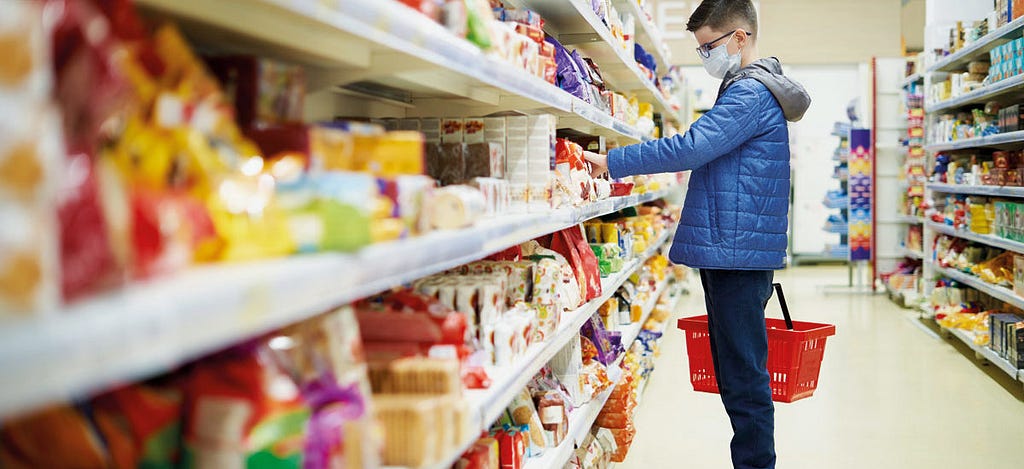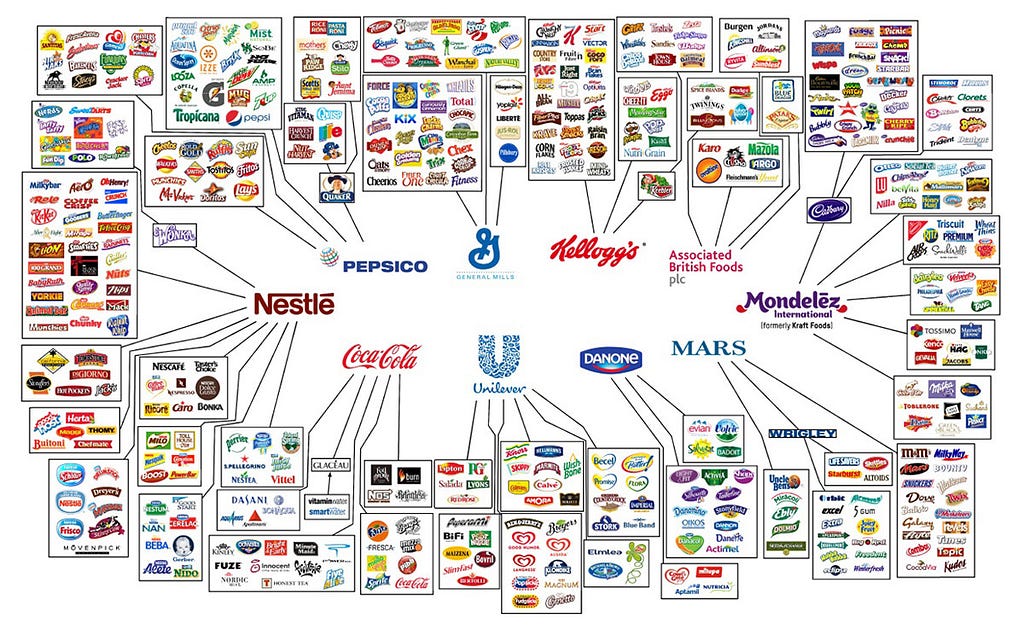When you go to the supermarket, do the shopping and look at the car, you see that you have bought a lot of various products that a priori belong to different brands, but if you look closely, in reality, who you have given your money to is not that manufacturer in particular, but rather the multinational that owns each of these brands, and it is that among only 10 big brands that group all the others, they control 90% of the agri-food market. Thus all our money remains in the cash register of one of those 10 companies.
The business of these 10 large food multinationals consists of the acquisition of a large quantity of fresh products at low prices from producers in the primary sector, to later process or ultra-process them, package them, and put them on sale under an exclusive brand with a strong marketing and advertising campaign, for a high price. In this way they manage to sell a food purchased from a farmer, fisherman or rancher at low cost to sell it in supermarkets around the world at high cost. The profit is higher than the value added during processing. A whole business.
But this whole set-up is collapsing due to various factors. The first of these is the decrease in the production of fresh food due to the loss of profitability on the part of farmers who see their harvests reduced due to drought, farmers and ranchers due to the low prices they are paid that do not cover costs, and by the rise in their own costs, or by fishermen who see their activity limited by the reduction in fishing quotas and by the increase in fuel prices. They all complain about the difference between the price they are paid for potatoes, milk, or fish, and the sale price of that same product in supermarkets, where the difference has remained between the intermediaries through which your product has passed until reaching the shelf.
The rise in energy costs, that of fertilizers and other inputs, have made them lose the profitability of their farms, which has put them against the wall, and is taking them to the limit, which many companies have already crossed, and that has forced them to close what was their livelihood. Inflation, the coronavirus pandemic and the war in Ukraine, which have broken the supply chain, have caused the shortage and increase in the cost of some inputs, such as wheat and sunflower oil, to give just two examples, which they have contributed to the rise in inflation and have placed the food sector as a whole in a crisis situation.
Now all the parties are complaining: the producers because of the low prices of their products at origin. Companies due to the high energy costs of raw materials, as well as the decrease in sales, sellers due to the decrease in their sales, logistics companies due to the increase in fuel prices, and consumers due to the increase from the shopping cart.
The high cost of the shopping basket is affecting the population with less purchasing power to a greater extent, who are seeing fewer and fewer products enter their basket because many of them are out of their reach, and for the lowest incomes, supposes that the level of poverty is reached and in the most extreme cases that of hunger. Worst of all is that more and more families follow this progression that leads to famine in ever larger sectors of the population, and this is happening not only in the third world, but even in the most developed countries.
But when one reviews in the opposite direction how the benefit is distributed between the links of this food chain starting from what the consumer pays for a liter of milk, and reaches the link of the multinationals in the sector, it verifies that the business benefits of these, and those coming from intermediation are increasingly higher, while the benefits of those who are part of the primary sector are reduced, or disappear, or enter into losses, at the same time as the price that the consumer has to pay for that liter of milk, it goes up.
How can this be explained? Well, it is due to the concentration of the food sector in very few multinationals that manage to control practically all the links in the market, and throughout the world.
And in the meantime, what are governments doing to guarantee the food supply?
Well, in most cases nothing or almost nothing, in others their measures are insufficient, and only in some countries are governments regulating and taking measures to protect those most affected.
In the latter case, with proposals to intervene in the markets with measures such as capping the price of food, VAT reductions, abolition of taxes for basic products in the basket, subsidies for those who do not have resources, and pressure on intermediaries and companies to reduce their profit margins, multinationals put the cry in the sky and pressure to avoid these measures and avoid the regulations that they fear so much and that harm their business.
In these cases, large food multinationals tend to prefer self-regulation over regulation, because they understand that if they regulate themselves, they prevent the government from doing so, which will always deepen the cut because it doesn’t hurt them, the damage to their income statement will be less.
Today, clear and forceful public policies are needed that protect above all and in the first place the producers of fresh food: farmers, ranchers and fishermen who are the ones who provide us with the food we need to live.
Secondly, we need public policies that guarantee access for the entire population, not only to food, but to other basic products such as soap or compresses, to give an example.
Thirdly, we need public policies that, in cases in which the self-regulation of the markets is broken, either due to alterations in the law of supply and demand, or due to the excess of greed of the large operators, intervene the market and interventionist and marketing control measures are advocated to monitor the behavior of the entire supply chain, and excesses are avoided.
Sources: Magnet, iAuditoría, Consumer, Política Exterior
El artículo se puede leer en español en este enlace.


Comments